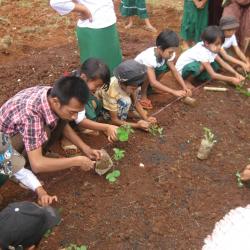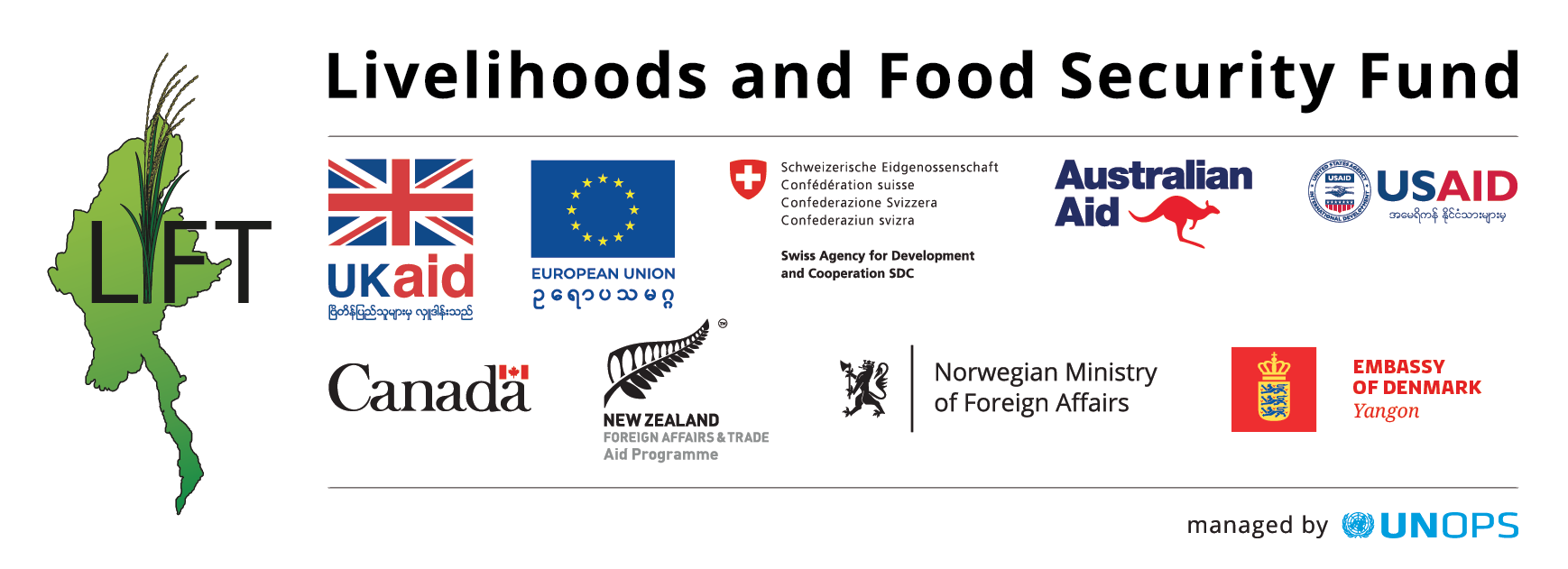
Original Article Available at :
LIFT promotes better nutrition through its country-wide food security and livelihoods programmes, and particularly through projects like LEARN (Leveraging Essential Nutrition Actions to Reduce Malnutrition). Implemented by Save the Children, Action Contre la Faim and Helen Keller International, LEARN raises awareness on the importance of nutrition and the long-term consequences of malnutrition throughout the country by helping local and other organisations to integrate nutrition into their livelihoods projects.
One aspect of this is to teach good nutrition from an early age. “Teaching children about a nutritious diet and shaping their preferences is important since it is much harder to change the diets and habits of adults,” says Leslie Koo, LEARN's former project manager. “Lack of variety in the diet is a serious problem in Myanmar, and it is one of the causes of long-term malnutrition that we need to address.”
An innovative way to help young children understand nutrition is through school gardening, which teaches children about the basics of agriculture, environmental management and nutrition – in particular the importance of fruits and vegetables in the diet. School gardening is a hands-on form of learning that appeals to young, open minds. In a recent UN Food and Agriculture Organisation report, school gardening was seen to increase children’s preferences to fruits and vegetables while improving their attitude to their natural environment.
CESVI, an Italian non-governmental organisation, is piloting 20 school gardens in Naung Cho and Kyauk Mae Townships in Northern Shan State with LIFT funding. In an area where local food production is insufficient to meet consumption needs and where malnutrition is a pressing concern, school gardens grow nutritious food while raising awareness of the importance of variety in the diet among children, parents, teachers and the community.
 Learning takes place both in the classroom and in hands-on outdoor sessions, with garden plots on the school grounds. The children get to decide which fruits and vegetables to grow, based on their preferences as well as nutritional value since the crop is shared among the students at harvest time. So far, over 20 types of fruits and vegetables have been planted, with pumpkin, kidney beans, watercress, eggplant, carrot, papaya, strawberry and mango being the favourites. CESVI supports School Gardening Associations to organise activities such as community “Harvest Lunch Days”, cooking demonstrations, and seed fairs to spread the word to other members of the community.
Learning takes place both in the classroom and in hands-on outdoor sessions, with garden plots on the school grounds. The children get to decide which fruits and vegetables to grow, based on their preferences as well as nutritional value since the crop is shared among the students at harvest time. So far, over 20 types of fruits and vegetables have been planted, with pumpkin, kidney beans, watercress, eggplant, carrot, papaya, strawberry and mango being the favourites. CESVI supports School Gardening Associations to organise activities such as community “Harvest Lunch Days”, cooking demonstrations, and seed fairs to spread the word to other members of the community.
Malnutrition in Myanmar
Malnutrition is a major public health problem in Myanmar, with one in three children suffering from chronic under-nutrition. The traditional Myanmar diet, starting from early childhood, includes a large proportion of rice but few fruits and vegetables, which provide the important vitamins and mineral required for optimal growth and development. Malnutrition leads to numerous problems later in life including learning difficulties, increased risk of chronic diseases, and lower income-earning potential in adulthood. Global evidence highlights that the first 1,000 days of a child’s life – from conception to a child’s second birthday – are the critical window of opportunity for improving nutrition outcomes and preventing irreversible consequences on human development.
LIFT and LEARN have also been involved in advocacy at the national level through participation in the Scaling Up Nutrition (SUN) movement – a global initiative that Myanmar signed onto in 2013 to show its commitment to addressing malnutrition. LIFT and LEARN are focusing on the “1,000 Days”, especially by promoting dietary diversity for pregnant and breastfeeding women and children from 6 to 24 months. A promotional video has been made, and is available to share widely on LIFT's YouTube Channel.
By integrating nutrition into projects that aim to improve the food security and livelihoods of the poor, LIFT intends not only to improve current livelihoods but also to break the intergenerational cycle of poverty and food insecurity in Myanmar.
Please watch and share the 1000 Days video.


